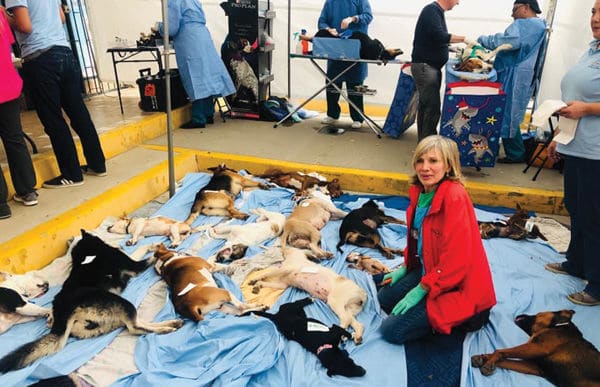
In an impoverished neighborhood in Ensenada, Mexico, outside the veterinary offices of Veterinaria California–Colinas de la Presa, hundreds of residents lined up around the block with their pets at 8 a.m. on a recent Sunday morning. They were there for a free spay/neuter clinic, with 12 volunteer veterinarians standing at the ready in a makeshift tent with ironing boards set up as operating tables. A blanket-draped area of the parking lot would serve as a surgical recovery area.
Local resident Geraldine Gilliland, founder of Chiquita’s Friends dog rescue, not only paid to sponsor this clinic for dogs and cats on Jan. 26, but served as a volunteer. The event was organized by fellow dog rescuer Johnny Ray Gearhart, founder of BirdHouse/DogHouse Rescue Foundation of North Hollywood. Gearhart, who organized these types of events before, collected beds, blankets and vet supplies from donors around Los Angeles County to bring to Mexico, and created the Facebook ad in Spanish that drew 300 pet owners.
Joining Gilliland as volunteers were Charlotte Meade of sister organization Meade Canine Rescue and volunteer Mark Sorrentino, MD, a native of Westlake Village.
The cost to sponsor the event was $30 per pet, which includes the spay/neuter surgery plus vaccinations. Although $30 doesn’t sound like much, to the poor of Ensenada, it’s a day’s pay that most cannot afford.
In describing the process the pets went through, Gilliland described a clinic efficiently set up like an assembly line. Animals were weighed on an old scale held together with duct tape. Their weight was written on a piece of paper and tied around their neck with a string, so vets could use it to calculate the amount of anesthesia needed. Each animal was then shaved and prepped for surgery, which was performed by a vet operating on an ironing board under a tent. Afterward, they were taken to the post-op recovery area.
“The volunteers worked from morning until night,” she said. “We didn’t turn one dog away and none died. There were even pregnant pets. Altogether, surgery was performed on 266 dogs and 25 cats, which saved 18 million lives from being born. It was a high beyond all highs.”
Sorrentino—a world-renowned pediatric researcher—went strictly as a volunteer and spent all day assisting a vet with surgery and anesthesia. “The vet spoke good English and I speak some Spanish, [so language was not a problem],” he said.
“The vet I worked with was one of the few to have an assistant, so we did double the number of dogs as anyone else, and they were almost all big female dogs, which take more time. We worked from about 8:30 a.m. to 7:30 p.m.,” he said. “Conditions were primitive, but all of the instruments were properly sterilized and standards were followed.”
“The people were so gracious and thankful, and they listened to directions and were organized,” Sorrentino continued. “There was so little barking, and no dog fights—the dogs were all well behaved. I can’t wait to do this again. I was so excited about being able to help. It’s a great program they have.”
Charlotte Meade echoed that praise.
“It was a fantastic experience, and the teamwork was amazing,” she said. “It’s the most worthy cause I’ve ever been involved in, in 30 years of dog rescue. Spay/neuter is so much more important than rescuing one dog at a time.”
During the clinic, one puppy that had been left for dead in the street was brought in with a broken jaw. The pup needed surgery, IV, X-rays, blood tests and several weeks in the hospital. Another puppy—emaciated and covered with mange—was surrendered to the clinic. Both will be cared for by the vets and then adopted out.
The next event in Mexico is being planned for April. Gearhart is planning the first “Catch-Care-Fix-Release” program to help control the overpopulation of street dogs in Tijuana. Volunteers from Southern California and Tijuana will work together to trap/catch 150 street dogs and cats and put them through a process of spay/neuter, deworming, vaccinations, grooming and medications, then place the sickest ones in foster homes.
Gearhart said he is sometimes criticized for helping dogs in Mexico instead of the U.S., but replied, “The dogs don’t know what country they live in; they just need help. There are thousands of sick, starving dogs there.”
To make a donation to help pay for medications, supplies and veterinary care, go to: chiquitasfriends.org/donate.


